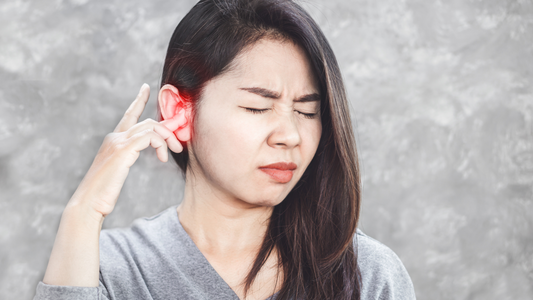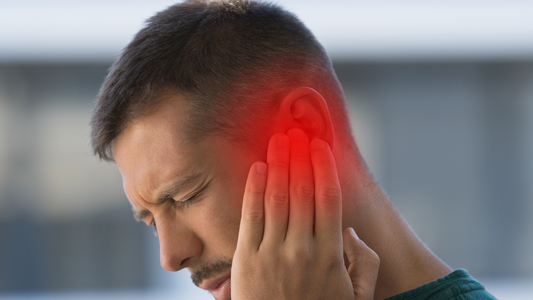Sitting down with a cup of tea, aiming for some peace and quiet, but there’s a persistent noise that just intrudes? Annoying, to say the least. Well, over 50 million Americans deal with this daily—tinnitus, the relentless noise that can overwhelm your thoughts. Struggling with the constant ringing in your ears and wondering if it’s there to stay?
Recall a time when the quiet around you actually meant quiet, no ringing involved. Was it pure chance, or possibly a sign that the noise tormenting you might be subsiding? If you're looking for even a small win against that incessant sound, you're in good company. Today, we take a look at subtle improvements with tinnitus and the habits that may be prolonging the issue. Settle into your comfy spot; we're discussing how to encourage more quiet moments in your everyday life.
Noticing the Quiet Moments: a Sign Tinnitus May Be Fading
Let's say you've got this persistent buzz in your ears, kind of like being followed by an invisible bee. Then one morning, you notice it's not as loud. You might catch yourself questioning, "Is it actually easing up?" It's not a big fanfare kind of moment, but it sure feels like a step in the right direction. This might just mean your tinnitus is starting to back off a bit.
Episodes of Silence
For a while, it could be that non-stop ringing was just part of your day. But then, maybe you get these short breaks where it all goes quiet — kind of like when a noisy appliance finally shuts off and you realize the house isn't all that loud. If these quiet spells are happening more often, it could be your ears telling you the tinnitus might be packing its bags.
Improved Ability to Focus
The lower that tinnitus volume gets, you might find you can think clearer, like a fog's lifting. Say you're suddenly able to get lost in a book or a show without that annoying sound distracting you, it's possible your tinnitus is on its way out.
Moments of Better Hearing
And here's another thing you might notice: understanding people better, even with background noise. It's as if your hearing just got a bit more high-def. When things start sounding clearer, it could be a sign that your tinnitus is taking a hike.
What Worsens Tinnitus?

It's helpful to recognize when tinnitus eases up, but equally vital to know what ramps it up. Think about your daily habits. Could you be inadvertently cranking up that bothersome ringing?
Loud Surroundings
Ever notice how your ears ring after leaving a noisy spot? That's a clue loud noises can agitate your ears. Find yourself in a raucous place like a live gig or a buzzing job site? Look after your ears. Earplugs or noise-reducing headphones are good bets.
Unhealthy Habits
A smoke break, a casual drink – they might be your unwind go-tos, but they can also dial up tinnitus. Think about easing off or maybe kicking the habit for your ears' sake.
Troublesome Treats
Love a good snack, right? Watch out, though – certain bites might hike up that ear ringing. Caffeine kicks and salty noshes aren't your friends here. Try swapping for a piece of fruit or a handful of nuts and track the change.
Being Under Pressure
Feel like you're at your wit's end sometimes? Stress can tweak your tinnitus, too. When the pressure mounts, find your chill. Gardening, art, or some mellow tunes can work wonders.
Conclusion
Understanding the signs that tinnitus may be on its way out is key, but knowing what aggravates it is just as important. Steer clear of activities and habits that could make a temporary nuisance become a permanent guest. We can't stress this enough - don't take tinnitus treatment into your own hands.
If your ears are plugged with wax, don't reach for the cotton swabs; they're more likely to make things worse, not better. It's better to play it safe and get a specialist, like an ENT, to take a look. They're the pros who can figure out what's really going on and get you the help you need.
Have you put tinnitus behind you? If you've found your silence, why not share what worked for you in the comments? Your insights could be invaluable to someone else struggling with the ringing.
Wrapping Up the Sound Advice
Getting some quiet after a long day of noise feels pretty good, doesn't it? It's kind of like when you finally get a break from the neighbor's loud leaf blower. If you start noticing more quiet times, it could be a sign that your tinnitus is letting up. And those things that seem to make the ringing worse? Staying away from them could keep your days quiet and comfortable.
So you're wondering what to do if your ringing ears are more than just an annoyance. That's when it's time to talk to a professional. You might have heard about HearWell Group's hearing aids, and they could help with your tinnitus. Might be worth looking into, right? You want your quiet back, so why not give it a shot? The worst you could do is still hear some noise.
Sources & References
- Baguley, D., McFerran, D., & Hall, D. (2013). Tinnitus. The Lancet, 382(9904), 1600-1607. https://www.thelancet.com/journals/lancet/article/PIIS0140-6736(13)60142-7/fulltext
- Tunkel, D. E., Bauer, C. A., Sun, G. H., Rosenfeld, R. M., Chandrasekhar, S. S., Cunningham, E. R., Archer, S. M., Blakley, B. W., Carter, J. M., Granieri, E. C., Henry, J. A., Hollingsworth, D., Khan, F. A., Mitchell, S., Monfared, A., Newman, C. W., Omole, F. S., Phillips, C. D., Robinson, S. K., Taw, M. B., … Whamond, E. J. (2014). Clinical Practice Guideline: Tinnitus. Otolaryngology–Head and Neck Surgery, 151(2_suppl), S1-S40. https://journals.sagepub.com/doi/10.1177/0194599814545325
- Langguth, B., Kreuzer, P. M., Kleinjung, T., & De Ridder, D. (2013). Tinnitus: causes and clinical management. The Lancet Neurology, 12(9), 920-930. https://www.thelancet.com/journals/laneur/article/PIIS1474-4422(13)70160-1/fulltext
- Hoare, D. J., Edmondson-Jones, M., Sereda, M., Akeroyd, M. A., & Hall, D. (2014). Amplification with hearing aids for patients with tinnitus and co-existing hearing loss. Cochrane Database of Systematic Reviews, 1, CD010151. https://www.cochranelibrary.com/cdsr/doi/10.1002/14651858.CD010151.pub2/full
- Cima, R. F. F., Mazurek, B., Haider, H., Kikidis, D., Lapira, A., Noreña, A., & Hoare, D. J. (2019). A multidisciplinary European guideline for tinnitus: diagnostics, assessment, and treatment. HNO, 67(1), 10-42. https://link.springer.com/article/10.1007/s00106-019-0633-7

The Hear Well Group Research Team: Trusted Hearing Health Insights
Our experienced research team compiles hearing health data from credible, peer-reviewed sources and presents it in easy-to-understand terminology. We ensure accuracy and trustworthiness, providing up-to-date, evidence-based recommendations to enhance hearing care practices and inform our readers' hearing well-being decisions.


